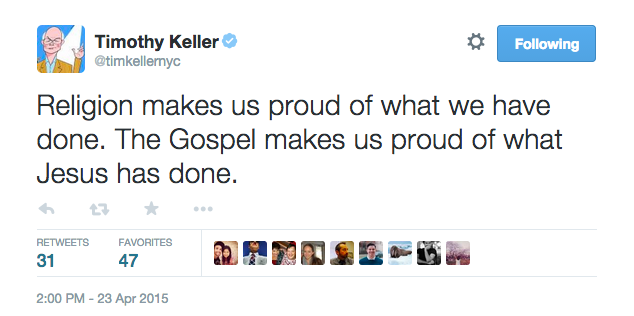I’ve often resisted writing about this, because what can be written about Karl Barth’s religion-Gospel dichotomy other than the obvious?
Namely, that like all dichotomies based on semantics, it is inherently vacuous?
Namely, that while it’s already ridiculous to, in any but the most cursory way, lump together arguably the most profound, the most complex, the most variegated, the richest set of human experiences and cultural institutions under the label “religion”, it is ridiculous-squared to then give that label such a procrustean definition as Barth does?
Namely, that the religion-Gospel dichotomy is based not only on a false reading of human experience and history, but of the Christian Scriptures themselves, since the Gospel is not a repudiation of Judaism–which, in this view, falls squarely under the label “religion”; and which, after all, takes up a good chunk of the Bible–but a redefinition of it, and so the dichotomy is at best a form of Marcionism Lite? (Of course, this is contentious terrain, since once you realize this you realize that the entire Reformation is based on bad exegesis of a couple verses, but, hey, I’m not the one doing the reductio ad absurdum, Barth is.)
Namely, that it’s just so despairing and meh to see all human religious experience (all!) clumped under the heading of Medieval and post-Medieval Reformation theology of “How do I get saved?” and “How do I get justified?” at the exclusion of everything else, as if that was the only thing that religion–Christian or non-Christian–was about?
Namely, that the vacuity and fruitlessness of this dichotomy is the logical endpoint of Barth’s monomania about natural theology and the analogy of Being. Of course, all men have in them a natural desire for God, because they have been created with that desire (“Lord, you made us for Yourself…”), this is only one of the most basic orthodox Christian doctrines, and so of course, natural religion is simply man’s natural response to this inborn attraction to the transcendent, some aspects of which can be glimpsed–by the grace of God, which is always bigger than our imagination–and perhaps grasped even through natural religion. I’ve always thought that it’s a very ungracious kind of Christian who refuses to notice the profound truths and beauties that are often to be found in natural religion, and who fails to rejoice at them as evidence of the supererogatory character of God’s grace. And, yes, equally of course, apart from special revelation, natural religion can be distorted by man’s fallen nature (not to mention, Paul is right to warn us, evil spirits) and certainly cannot reach the fullness of truth, goodness and beauty that the true religion does. But granting this in no way justifies the dichotomy.
Namely, that you think you’re so clever evangelizing post-Modern, post-Christian folk by telling them “You think Christianity is religion, but no, true Christianity isn’t religion, because religion is this thing over there, and true Christianity is TEH GOSPEL!!!1” but really you’re just making yourself look like an insecure guy at the bar trying too hard to impress.
If we’re really going play this game and assign a definition to “religion” and ponder whether and how Christianity fits under this, one way of looking at it that I would call attention to is Joseph Ratzinger’s in his Introduction to Christianity, where he contrasts philosophy and creed. Philosophy really is (or at least, the claim is much more defensible than for “religion”) man’s attempt to rise towards the transcendent by his own powers. But a creed, by its very nature, comes down to us from, so to speak, the Beyond. What is more, a creed by its nature fashions a people, because if I say the creed, and you say the creed, then all of a sudden we have something absolutely fundamental in common. The creed, in other words, binds us together–which is of course what the Latin word religio means–in a way that philosophy does not.
Christianity, in the end, isn’t “the Gospel” in that narrow Calvinistic sense, nor is it a set of doctrines, or a morality, or even (important as that is) a “personal relationship with Christ”, it is God’s own action (perfectly free, perfectly gracious) to redeem His Good Creation fallen prey to sin and death. And the Bible always speaks of this action not in terms of a private experience of “salvation”, but in terms of God forming a people in his own likeness to spread his blessings. That is what Christianity is: God’s forming of his people, God’s binding them, to him and to each other (hence the Covenant), with Christ at their head, to redeem His Good Creation through them.
In that sense, then, of course Christianity is a religion, the divine work that binds us together to the work of discipleship and to the process of theosis and of redivinization of the Universe.
Just in case you were wondering.











